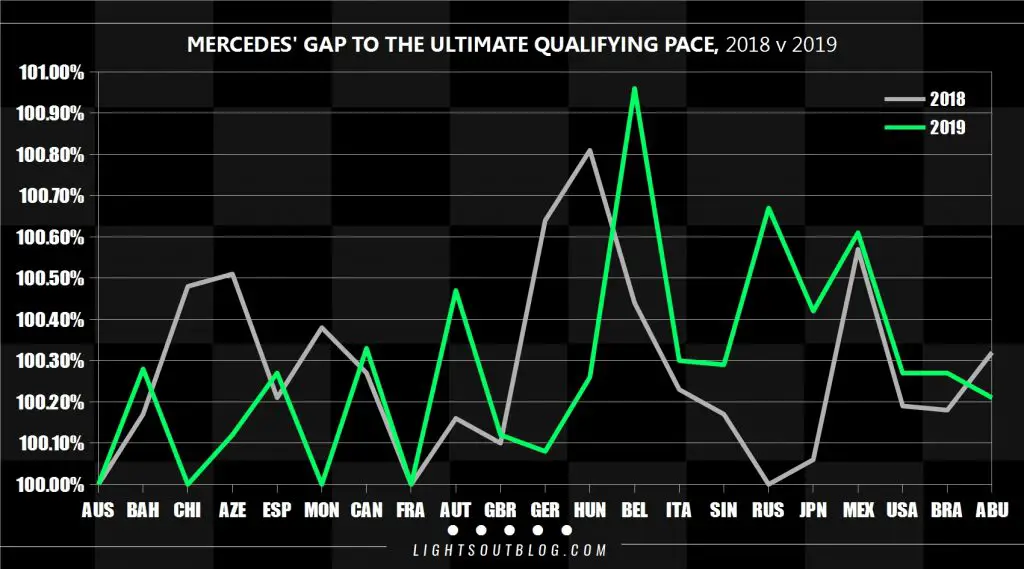2019 was another record-breaking year for Mercedes as they became the first team in history to win six consecutive Drivers’ and Constructors’ Championships. Here are all the numbers, facts and statistics from their 2019 season.
 This was going to be Ferrari’s year and the year that Mercedes’ domination of Formula 1 finally came to an end, right? Mercedes silenced the pre-season chatter with five consecutive 1-2 finishes in the first five races. They went on to record four more 1-2 results over the course of the season. There were only seven races this year which didn’t feature two Mercedes drivers in the top three, while Germany, Singapore and Brazil were the only races this season to not feature a Mercedes driver on the podium.
This was going to be Ferrari’s year and the year that Mercedes’ domination of Formula 1 finally came to an end, right? Mercedes silenced the pre-season chatter with five consecutive 1-2 finishes in the first five races. They went on to record four more 1-2 results over the course of the season. There were only seven races this year which didn’t feature two Mercedes drivers in the top three, while Germany, Singapore and Brazil were the only races this season to not feature a Mercedes driver on the podium.
Germany, in which Mercedes celebrated 125 years of motorsport by donning fancy dress and running a special livery, was their lowest point of the season – if not the hybrid era – as Bottas crashed out, and Hamilton was left waiting over a minute in an uncoordinated pit stop, ultimately finishing only ninth. While they couldn’t challenge Ferrari for pole over the opening races of the second half of the season, arguably their only other off day in 2019 came in Singapore, when Hamilton and Bottas had the pace to finish only fourth and fifth.
Their rare off days could not prevent them from becoming the first team to be guaranteed six consecutive Drivers’ and Constructors’ Championship at the Japanese Grand Prix. How much longer will Mercedes’ domination of F1’s hybrid era continue?
[one_half]
RACE STATISTICS
- Championship Position: 1st
- Total Points: 739
- Points Scoring Races: 21
- Double Points Finishes: 19
- Best finish: 1st (x15)
- Number of DNFs: 2
- Laps Led: 696
- Laps Complete: 2495 (1st)
- % of Laps Complete: 98.85%
- Distance Covered: 12640.591km
[/one_half][one_half_last]
QUALIFYING STATISTICS
- Both cars in Q3: 21
- Q3 Appearances: 42
- Q2 Exits: 0
- Q1 Exits: 0
- Best Qualifying Position: Pole
- Worst Qualifying Position: 6th
- Average Gap to Ultimate Pace: 0.28%
[/one_half_last]
A STATISTIC FOR EVERY GRAND PRIX
Australia: Mercedes began their season continuing their winning form from the end of 2018. With their sixth Australian Grand Prix pole position, courtesy of Lewis Hamilton, Mercedes have now taken more poles at Albert Park than any other team. It also meant that a Mercedes-powered car has taken a pole position in seventeen consecutive seasons, equalling Ford Cosworth’s record.
Bahrain: Mercedes took their 89th Formula 1 victory at the Bahrain Grand Prix. Impressively, while it was their first 1-2 finish at the event since 2014, they’ve finished on the podium with both cars in all of the last six races at the Bahrain International Circuit. As a result, the team have now had twelve podiums at the track. They also became the second team to have led 200 laps at the circuit.
China: Mercedes won the 1,000th Formula 1 race, recording their 90th victory. The team have won five out of the last six China races. They recorded their third 1-2 finish at the track, the others being in 2014 and 2015. This 1-2 finish saw them equal McLaren’s tally of 47 1-2 finishes. It was the first time the team scored three consecutive 1-2 results since the end of the 2016 season, as well as the first time a team have started a season with three consecutive 1-2s since Williams in 1992.
Azerbaijan: At the Azerbaijan Grand Prix, Mercedes took pole position for the 104th time, and locked-out the front row for the 62nd time – equalling Williams’ tally of front-row lock outs. Mercedes claimed their 91st Grand Prix victory thanks to Valtteri Bottas – and with Lewis Hamilton finishing second, the team recorded their fourth consecutive 1-2 finish of the season. It was the first time in F1 history that a team have opened their Constructors’ Championship charge with four consecutive 1-2 finishes, as well as being the first time a team have taken a 1-2 finish at the Baku City Circuit. The 2019 Azerbaijan Grand Prix also marked the 200th consecutive race in which a Mercedes-powered car has scored a point.
Spain: Mercedes took their fifth consecutive 1-2 finish of the 2019 season at the Spanish Grand Prix. It was the third time they have taken five consecutive 1-2 finishes, having previously done so from Malaysia to Monaco 2014 and from USA 2015 to Australia 2016. They have now achieved the feat more times than Ferrari. Mercedes also scored their 63rd front row lock-out at this event, equalling McLaren for second in the all-time list of most front row lock outs.
Monaco: No team has ever finished first and second in six consecutive races before in Formula 1 history – and Mercedes fell short of becoming the first team to do so at the Monaco Grand Prix. Though Lewis Hamilton won, Valtteri Bottas finished third – just half a second behind second-placed Sebastian Vettel.
Canada: For the first time in 2019, there was only one Mercedes driver on the podium. Valtteri Bottas finished fourth, marking his and the team’s worst finish so far in 2019. It was the first time Bottas failed to finish on the podium at Circuit Gilles Villeneuve since the 2014 season.
France: At the French Grand Prix, Mercedes secured their 95th win and their 50th 1-2 finish. It was their tenth consecutive victory, equalling their own personal best streak. They’d previously taken ten consecutive wins between the 2015 Japanese Grand Prix and the 2016 Russian Grand Prix, and between the 2016 Monaco and Singapore Grands Prix. Meanwhile, Lewis Hamilton’s pole saw Mercedes secure their 107th start from the front, equalling Lotus’ tally of pole positions and putting them equal for fourth in the all time list. Impressively, at this point, Mercedes had taken pole in almost 55% of the races which they’ve entered!
Austria: At the Austrian Grand Prix, Mercedes had the chance to equal McLaren’s record of eleven back-to-back wins. But for the second year in succession, they failed to win the event – recording their first non-victory of 2019. For the first time since F1 returned to Austria, Mercedes also failed to set the fastest time in any of the three qualifying sessions at the Red Bull Ring.
Britain: With both Lewis Hamilton and Valtteri Bottas finishing on the podium at the British Grand Prix, Mercedes reached 197 podium appearances. That means they equalled Lotus as the team with the fourth-most podium finishes in Formula 1 history. It was the seventeenth time a team have scored a 1-2 finish at the British Grand Prix.
Germany: Mercedes had a nightmare home weekend at the German Grand Prix. Lewis Hamilton finished only ninth, while Valtteri Bottas recorded the team’s first DNF of the year. They picked up just two points – their lowest points haul since their double DNF in the 2018 Austrian Grand Prix.
Hungary: Mercedes returned to form at the Hungarian Grand Prix with Lewis Hamilton scoring their 97th Grand Prix win. Hamilton’s podium meant that the team were now the outright fourth most successful in history by way of podiums. They became the first team to take wins in consecutive years at the Hungaroring since McLaren did so in 2011 and 2012.
Belgium: With both Lewis Hamilton and Valtteri Bottas finishing on the podium at the Belgian Grand Prix, Mercedes became only the fourth team in Formula 1 history to reach 200 podium finishes.
Italy: There was a strange statistic at the 2019 Italian Grand Prix. Mercedes reached 505 points scored in the 2019 season on the same weekend that Nico Hulkenberg reached 505 points scored in his entire career!
Singapore: The 2019 Singapore Grand Prix was the first Singapore race where neither Mercedes driver finished on the podium since 2015 – which was also the last time the team failed to win at the circuit.
Russia: Mercedes’ win in the 2019 Russian Grand Prix meant that they continued their 100% win record in the country – a record which goes all the way back to 1913! It was their fourth 1-2 finish at the Sochi Autodrom from the six events held here and the Russian Grand Prix became the fourth event which Mercedes have won six times. Though they eventually won the race, 2019 was the first time that Mercedes have failed to be fastest in any of the practice or qualifying sessions at the Sochi Autodrom.
Japan: Valtteri Bottas recorded Mercedes’ 99th win in Formula 1 at the Japanese Grand Prix and with it they became the fifth team to have claimed six Constructors’ Championships. They’re also only the second team to have taken six titles consecutively, the first team to do so since Ferrari achieved the feat between 1999 and 2004. The race result meant that only Lewis Hamilton or Valtteri Bottas would win the 2019 World Championship, ensuring that Mercedes were the first team in history to win six consecutive Drivers’ and Constructors’ titles. Mercedes have now won every Japanese Grand Prix since 2014, making Suzuka the fifth track at which they have won six or more times.
Mexico: Win number 100 followed for Mercedes at the Mexico Grand Prix. It came 23,857 days after their first victory at the 1954 French Grand Prix. They became the fourth team to reach a century of wins; the first to do so since Williams recorded their 100th victory at the 1997 British Grand Prix.
USA: While Valtteri Bottas scored Mercedes’ 101st Grand Prix win, Lewis Hamilton made the team the third to have won eight Drivers’ Championships. In qualifying, Bottas appeared in Q3 for the 60th consecutive event. With that, he equalled Nico Rosberg as the driver to have had the second-most consecutive Q3 appearances. Rosberg appeared in Q3 at every race between the 2013 Brazilian Grand Prix and the 2016 Abu Dhabi Grand Prix. Bottas’ current streak started when he joined Mercedes, meaning that the non-Hamilton Mercedes had appeared in Q3 at all of the last 120 races.
Brazil: At the 2019 Brazilian Grand Prix, Mercedes recorded their first ever retirement at the Interlagos circuit. It was the first retirement at Interlagos for the Brackley team since both cars were out at the 2007 race, under their Honda guise.
Abu Dhabi: Mercedes recorded their sixth consecutive victory at the Abu Dhabi Grand Prix in 2019. It means that they have won every race at the Yas Marina Circuit in the hybrid era. Qualifying also saw Mercedes’ drivers set the two fastest qualifying times, which would have made it an unprecedented sixth front row lock-out at a circuit, if not for Valtteri Bottas’ engine penalty.




